| PUBLIC MANAGEMENT IN SCOTLAND
SINCE 1895, when the Aberdeen proposals called public attention
to the question, suggestions for the public management of
the liquor traffic have received increasing support in Scotland,
where several important experiments are already in active
operation. The earliest of these owed its inception to Mr.
Charles Carlow, the managing director of the Fife Coal Company,
Limited, but it was left to Mr. John Ross, a well-known
educationist in Dunfermline, who is solicitor to the Fife
Coal Company, to develop and extend a tentative experiment
by organising the present public-house societies in Fifeshire.
THE HILL OF BEATH TAVERN, NEAR CROSS-GATES,
FIFESHIRE
|
Date established
|
Estimated Population of Village
|
|
June, 1896
|
1,300
|
The first of the experiments referred to above was that
established in 1896 at the Hill of Beath, a small colliery
village in Fifeshire. The village was built and is owned
by the Fife Coal Company, Limited, who rent the cottages
to the miners in their employ. The miner's tenancy of a
cottage ceases with his employment.
The present public-house is situate just outside the village
proper (i.e. outside the property of the Coal Company),
and was erected by its original owner for the express business
of a public-house, and he evidently chose the site in order
to escape the control of the Fife Coal Company. He appears
to have made unsuccessful application for a licence on two
occasions, and the Fife Coal Company, believing that a licence
was inevitable, decided to transform certain of their cottages
into a small public-house, and themselves to apply for a
licence. The first application (made in 1895), although
supported by the Chief Constable, was refused by eleven
votes to nine, and the matter remained in abeyance until
the following year, when the Fife Coal Company again made
application for a licence, a similar application being made
by the owner of the private premises. Mr. Carlow, in support
of the Fife Coal Company's application, stated that, in
the event of the licence being granted, the Company would
restrict themselves to a dividend of 4 per cent, on their
outlay, the balance of profit being spent for the benefit
of the village. In the result a licence was granted to the
Company by eleven votes to eight. The owner of the rival
house, evidently feeling that he no longer possessed any
chance of obtaining a licence, subsequently sold his premises
and all fittings to the Fife Coal Company for £1,500,
and the Company at once transferred the business from their
own house in the centre of the village to the present premises.
Until the end of last year (1900) the public-house was managed
by a committee of five, three of whom were representatives
of the Company, and the remaining two were elected by the
miners themselves. This committee seems to have been somewhat
careless in its appointments and arrangements, and two successive
managers proved unsatisfactory. In December, 1900, however,
the Hill of Beath Tavern Society, Limited, was formed, part
of the capital of which was subscribed by the miners themselves,
and the Fife Coal Company sold the public-house to this
Society for £1,200. This sum included not only premises,
fittings, stock, furniture, but also a balance of nearly
£300 in the bank.
The objects which the Society sets before itself in its
printed rules are " to carry on, in or near the village
of Hill of Beath, in the county of Fife, the businesses
of innkeepers, publicans, alehouse-keepers, cafe-, and restaurant-keepers,
manufacturers of aerated waters and such other commodities
as may be agreed upon by the members from time to time,
and purveyors and caterers for public entertainments and
amusements." The capital of the Society is raised in
shares of £1 each. No member other than a registered
society may hold more than £200 worth of shares. Each
shareholder is allowed one vote in respect of his holding
and irrespective of the total amount of his shares. Shares
are entitled to a dividend not exceeding 5 per cent, per
annum. The surplus profits, after making provision for (1)
depreciation of assets, (2) a reserve fund for the redemption
of capital, or other purposes, if the committee of management
resolve to establish such, and (3) share dividends, are
to be applied " to such purposes of public or quasi-public
utility in the village of Hill of Beath or neighbourhood
as the Society in general meeting may from time to time
determine."
The management of the Society is vested in a local committee
composed of six members and the Secretary. The chairman
of the present committee is the manager of the Fife Coal
Company's works, and the rest of the committee are working
men. The executive work is in the hands of the Secretary,
who receives a small salary, and who, subject to the committee,
orders and pays for all liquors. The promoters seem to have
been somewhat unfortunate in the appointment of their first
Secretary, but the present Secretary (Mr. W. Keir, who is
an employe in the office of the Fife Coal Company) appears
to be thoroughly in sympathy with temperance ideas and work,
and although he only entered upon his duties in March of
this year, he has already accomplished several valuable
improvements. One of his earliest acts was to induce the
committee to close the house at 9 p.m. instead of 10 p.m.
as formerly. The manager of the public-house receives a
fixed salary (£2 per week), with free house, coal,
and light. He is allowed the assistance of two helpers,
a lad and a woman, both of whom are paid by the committee.
The woman helper is not allowed to serve in the bar. By
way of security for fidelity, the manager is required to
take shares in the Society to the amount of £50, the
share certificate, together with a signed transfer of the
shares, being deposited with the Secretary. In his agreement
with the Society the manager binds himself " to carry
out all the instructions of the committee of management,
to secure the good conduct of the business and the diminution
of excessive drinking, and he binds himself strictly to
conform to all the conditions on which the licence is held,
and not to contravene these in any respect. He binds himself
particularly not to supply liquors to intoxicated persons
or to suffer persons in a state of intoxication to remain
on the premises." He further binds himself " to
refuse all perquisites whatsoever, and to report to the
committee the names of any merchants who may offer perquisites
to him or inducements to deal with them." He has nothing
to do with the ordering of the liquors; they are ordered
by the Secretary, who invoices the liquors to him at selling
prices. The present manager appears to be a thoroughly respectable
man, and fully capable of carrying out any policy that the
committee may decide upon.
The public-house itself is a good building and superior
to the ordinary public-houses in the district. It contains
five or six plainly furnished rooms downstairs, all of them
provided with seats, and a better furnished room upstairs
for the accommodation of travellers, cyclists, etc. As already
pointed out, it was originally erected as a private public-house,
and was only sold to the Fife Coal Company when the man
who built it failed to obtain a licence. The house is the
only licensed house in the village; but there are several
public-houses in Crossgates, which is less than half a mile
away, and it would seem to a stranger that they are sufficiently
near to have rendered the house at the Hill of Beath unnecessary.
There can be no doubt that the experiment is prejudiced
in the eyes of temperance people in the district from the
fact that its establishment meant an additional public-house;
but the responsibility for this is perhaps not strictly
to be laid upon the Fife Coal Company, since there appears
to be a general opinion that, if they had not taken action,
a licence would have been granted to a private publican
sooner or later.
No games or other amusements are allowed in the house,
nor is any credit given. There is no explicit rule in respect
of sales to children, but the manager stated that he refuses
to serve very young children, and suggested thirteen as
the age below which he would not serve. No attempt is made
at a " Black List," but it is said that such a
list is unnecessary, owing to the fact that all the regular
customers are in the employ of the Fife Coal Company, and
a man could at once be dismissed if he were guilty of disorder.
No provision is made for clubs, nor is there any stable
accommodation for carts, etc. The hours of sale are from
8 a.m. to 9 p.m.; the house is thus closed an hour earlier
than the public-houses in Crossgates, the change dating
from the appointment of the new Secretary in March last.
This reform is said to be possible because the house is
the only one in the Hill of Beath. Owing to the Forbes-Mackenzie
Act, there is no sale on Sunday.
A general public-house trade is done, spirits being sold
as well as beer. The purchases of liquor show that about
one gallon of spirits is sold to six gallons of beer. There
is a fair "off" trade, the same prices being charged
as for " on " sales. The trade in mineral waters
is relatively small, and there is little demand for food.
COUNTER-ATTRACTIONS TO THE PUBLIC-HOUSE
These consist of (a) a reading-room and institute, and
(b) a bowling-green, both of them separate from the public-house.
The institute has 110 members, which, considering that the
total population of the Hill of Beath is not more than 1,200
or l.SOQ, is a fair proportion. A yearly subscription of
sixpence per member is charged. The Public-House Society
has, however, in the course of erection a much larger and
better building, which it proposes to open as a new institute
to take the place of the present inferior building. The
new building, which will be ready by the autumn, will cost
fully £1,000, a sum which seems small considering
the character and quality of the building. The institute
will consist of four good rooms, one of which will be devoted
to the loan library, another will be fitted as a good reading-room,
and a third will be supplied with two billiard-tables and
also furnished with side-tables for other games, such as
dominoes, draughts, etc. There will also be a temperance
bar in the building. The building is certainly a good one,
and, so far as it goes, will well carry out the idea of
a counter-attraction to the public-house.
The bowling-green is also to be strongly commended. It
is situated in a central part of the village, and covers
a moderately large piece of ground given by the Fife Coal
Company. The sides and one end are stocked with shrubs and
plants, and give a pleasing effect, while the green itself
is about as perfect as a bowling-green can be. There is
a well-built pavilion, where the bowls, etc., are kept.
It is important to note that the counter-attractions are
entirely separate from the public-house, where no games
of any sort are carried on. In each case the counter-attraction
is a good distance from the public-house. In this connection
we may note a statement made by Mr. John Boss, the chief
promoter of the Fifeshire Public-House Societies, when discussing
the subject with one of the present writers. Mr. Ross stated
that he had originally proposed to associate the games and
recreative features of the experiment with the public-house
on the lines originally proposed by the Bishop of Chester,
and now by Lord Grey, but that the miners themselves had
represented to him that such an arrangement would not do,
and that the recreation must be entirely separate from the
sale of liquor.
STATEMENT OF RECEIPTS AND EXPENDITURE
The following statements give particulars of the receipts
and expenditure of the public-house for the last three years.
The third statement, it will be noticed, is for nine months
only, owing to the change from the old regime to the new,
which began on January 1st, 1901. The figures thus relate
in all cases to the earlier management of the house under
the committee appointed by the Fife Coal Company.
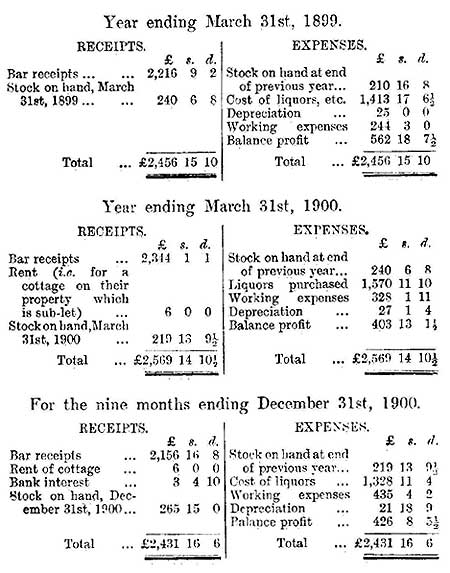
The reduced profits in 1900 appear to be chiefly accounted
for by the defalcations of the manager then employed, and
we were informed that they are also partly explained by
the fact that formerly spirits were bought at distillery
strength and reduced to selling strength by the manager.
Now they are bought at selling strength, and only the better
qualities are purchased.
APPROPRIATION OF PROFITS
The profits are devoted to various objects of public utility
in the village, among which are the lighting of the village
by electric light, the maintenance of the reading-room and
institute, bowling-green, etc. The disbursements for these
objects in 1898-9 and 1900 were as follows:
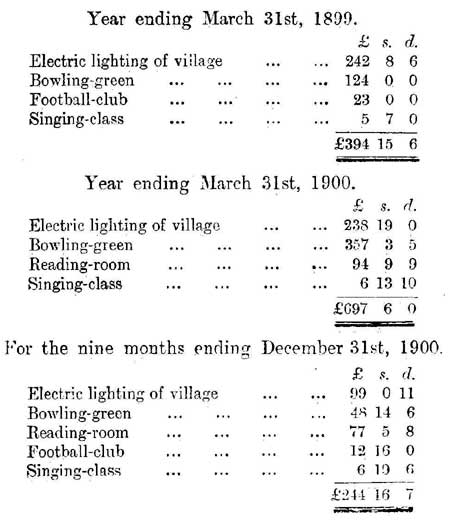
These objects were selected under the earlier regime, and
the appropriation annually made for electric light is certainly
questionable. Inasmuch as the Fife Coal Company are the
owners of the village and, apparently, the sole ratepayers,
they in the natural order of things must have borne the
expense of lighting the village, so that the allocation
of profits to this purpose, made when they had the control
of the public-house, actually relieves them of rates they
would otherwise have had to pay (It is not of course
suggested that the appropriation was deliberately designed
to this end, but the fact of relief appears to be clear.
It should, however, in fairness be noted that the Company,
in disposing of the property to the new Society in December,
1900, appear to have acted with great generosity.) In
any case the allocation of profits to this purpose is mischievous,
being a direct subsidy in relief of rates. The other appropriations
are of a character that can be heartily approved, this being
especially so in the case of the bowling-green and the reading-room,
which are direct and efficient counter-attractions to the
public-house.
RESULTS
In estimating the general results of the Hill of Beath
experiment it is necessary to distinguish between its present
management and its past. Like all similar experiments, it
has met with much criticism, some of it undoubtedly just,
but a part of it unquestionably hasty and ill-founded. In
the latter category must certainly be placed the suggestion
made by outsiders, but discredited by temperance workers
in the village itself, that the establishment of the house
has been responsible for a decline in the activity of certain
temperance societies, etc. in the village. That the establishment
of the house has not led to a diminution of drunkenness
is perhaps true, as also the allegation that, by increasing
the facilities for obtaining liquor, the establishment of
the house has actually increased the amount of liquor consumed
in the village; but the indisputable defects of the experiment
as at present conducted appear to be of a negative rather
than a positive character, and lie chiefly in the fact that
there is little actual difference in methods of management
between the Society's house and an ordinary well-conducted
public-house. Certainly the restrictions aimed at and imposed
do not appear to be as great as a somewhat exceptional opportunity
would permit. Probably the objection which more than any
other has influenced criticism against the experiment is
the fact that it has introduced a public-house where no
public-house previously existed, and where the neighbouring
facilities appear to have been sufficient to meet any legitimate
demand. Against this it is urged that in taking the action
they did the Fife Coal Company did no more than anticipate
events by keeping out a private licensee, and that from
this point of view the question really resolves itself into
one of choice between an ordinary public-house conducted
for private gain and one from which the element of private
profit has been eliminated. Without committing themselves
to a definite pronouncement upon the question of fact here
raised, but admitting its probability, the present writers
feel compelled to acknowledge that a consideration of all
the local circumstances (especially the close proximity
of Crossgates, where licensed premises exist) induces in
their minds a doubt of the wisdom and expediency of this
particular experiment.
THE KELTY PUBLIC-HOUSE SOCIETY, LIMITED
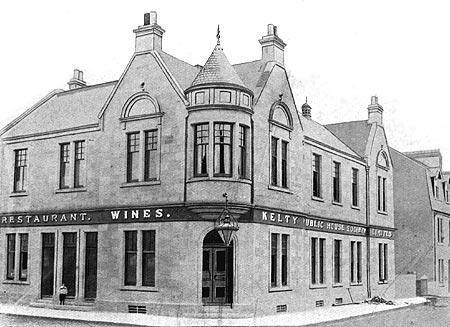
|
Date started
|
Population of Village
|
|
January 1st, 1900
|
4,700
|
The rules and constitution of the Kelty Society are so
closely similar to those of the Hill of Beath Society that
detailed description is nnnecessary. The chief differences
are: (1) that the share capital is raised in shares of five
shillings each instead of £\, and (2) that the committee
of management consists of eight instead of six members.
Kelty is another mining village belonging to the Fife Coal
Company. Its population at the recent census was nearly
4,700. It is the centre of a very prosperous mining district,
and work has been plentiful and wages high for some years
past. A proof of this prosperity is seen in the fact that
at one pit alone the daily output is from 1,600 to 1,800
tons of coal. The miners work eleven days a fortnight, and
their wages range from 6s. to 7s. 'id. per day, while mere
lads can earn from 2s. 6d. to 4s. per day. It thus happens
that the family income is, as a rule, high.
The proposal to establish a " Gothenburg " public-house
originated with Mr. John Eoss, of Dunfermline. Mr. Ross
paid a visit to Kelty in the autumn of 1899, and lectured
on the Gothenburg system. Shortly afterwards a meeting was
summoned to consider a definite proposal, which Mr. Boss
then submitted, to establish a " Gothenburg "
public-house in Kelty. The proposal aroused considerable
local feeling, and encountered much opposition from religious
and temperance people in Kelty, with the result that at
the meeting the proceedings were somewhat excited. Mr. Boss's
resolution failed to find a seconder, while a resolution
against the establishment of the hous-e was carried. In
the end it was decided that a plebiscite should be taken
on the question, and a committee was appointed for the purpose.
The promoters of the new public-house were asked to co-operate
by appointing to the committee a number of representatives
equal to those appointed by the public meeting. This they
declined to do, but the committee, nevertheless, included
some who were in favour of the scheme who had been nominated
at the public meeting. The question put to fhe voters was:
" Are you opposed to the granting of a licence to the
Kelty Public-House Company ? " The result of the voting
was as follows:
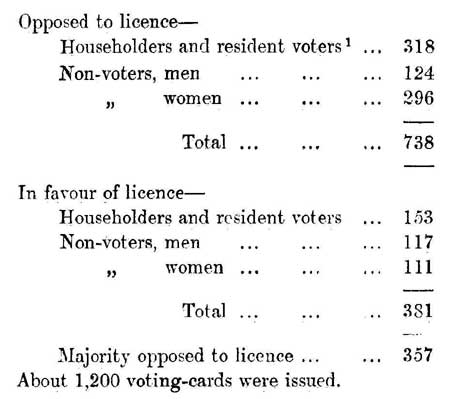
NB: Householders and Resident Voters - This heading
is said to cover resident parliamentary voters and such
other male householders as had not qualified for the parliamentary
vote.
It seems unfortunate, in face of such a pronouncement,
that the proposal was persisted in; at the same time it
is highly probable that an additional licence would have
been granted to Kelty in any case, so that the responsibility
of thrusting an additional licence upon the place is not
strictly to be charged against the promoters of the scheme.
Practically everyone agrees (and the chief officer of the
local police entirely endorsed this view in conversation
with one of the present writers) that an additional licence
had become almost inevitable owing to the pressure of trade
at the other houses and the growing population.
The new public-house stands in an exceedingly good position,
and is a substantial stone building much superior to the
other public-houses in the village. It was built specially
for its present purpose by the Kelty Public-House Society
at a cost (including furniture and fittings) of £3,500.
It is rated at £180 per annum. It has a large bar,
with accommodation for a crowd of customers; also a small
separate jug compartment, and four rooms off the bar. Upstairs
there is a large room, 30 ft. by 20 ft., furnished with
seventy chairs and used for Cricket-club dinners and teas,
dinners of the local Burns Society, smoking-concerts, etc.
There is also a restaurant room on the ground floor with
a separate entrance from the street.
The house was visited on Thursday and Friday, June 13th
and 14th, 1901. The latter day was the fortnightly payday,
and we were told that the houfe would be well patronised.
We visited the house at 9.40 p.m. The public bar was tolerably
full of miners, and two men were also drinking in the private
jug department. Trade was evidently brisk. The manager and
two other men were serving in the bar, and the place was
full of the loud voices usual in a busy public-house. The
manager stated that they had been exceedingly busy all the
evening. In addition to the general bar, the four rooms
off the bar were also full, the orders from these rooms
being taken by two young women who were busily engaged carrying
liquor between the bar and the rooms. At ordinary times
the bar is served by the manager and his assistant, but
when trade is busy the women-helpers also serve. They occasionally
serve when trade is slack if the manager and his assistant
happen to be in another part of the house when customers
come in. The manager much dislikes the side-rooms off the
bar, since he finds it impossible to keep them under his
own personal supervision and control. He mentioned that
he had " rushed out of the bar to get a flying look
at them at least twenty times" that evening.
The manager is a fairly young man, smart and respectable,
who has had previous experience of the public-house trade,
and he evidently does his best to keep the place respectable.
There are no special restrictions governing sale. He will
not knowingly serve liquor to any man who shows signs of
intoxication, and although there is no " Black List"
or anything approaching to one, he is able in a broad and
general way, from his knowledge of the place, to sort out
his customers (Speaking at Dunfermline on March 21st,
1901, Mr. John Ross stated that " tricks had been played
by putting men in the house who were already under the influence
of liquor, in order that blame might be attached to it;
but the greatest care was exercised, and the manager was
strongly backed up by the committee." ). He mentioned,
for example, that in some cases he would probably refuse
to serve a man who he knew was addicted to excess with more
than two pints, whereas he might serve other men with four
pints. In this respect observation would lead us to say
that the house is conducted much as an ordinary public-house
is conducted where there is a good manager.
The house is managed by a committee of the miners, which
meets every Monday. They have the assistance of a Secretary,
who receives a salary of £16 a year. The latter is
a teetotaler and thoroughly in sympathy with temperance
work, and the opponents of the scheme speak in the highest
terms of him. He orders all the liquors, and they are debited
to the manager at selling prices. The usual hours of sale
are observed, and there are no special restrictions concerning
the sale of liquor to children. No credit is, however, given.
A general public-house trade is done, but beer-sales preponderate.
The manager stated that, speaking generally, they would
sell about one hogshead of spirits and thirty-two barrels
of draught beer a month, besides bottled " Bass "
; also about two hundred and forty dozen of " minerals"
a month. (He explained that the mineral waters were being
largely used in conjunction with beer for what is known
as "shandy gaff").
He further stated that there was a fair " off"
trade, but that the " off " sales would not amount
to more than a tenth of the whole. In accordance with local
practice, beer is sold a halfpenny per pint cheaper for
" off" consumption.
The manager is paid a fixed salary of £2 per week,
with house, coal, and light. He receives no commission upon
sales, even in the case of mineral waters, but it was stated
that it is intended to let him have the profits on food
in the restaurant as soon as the restaurant gets properly
established. This restaurant is a good room with a separate
entrance. It has, however, only been running a short time
(being opened at the end of 1900), and at first involved
a loss, but it is now paying its way. It is not likely ever
to do a great business, inasmuch as it must depend upon
cyclists and other visitors, the miners themselves having
their meals at home. The manager at Kelty, as also the manager
at the Hill of Beath, confirmed what had been stated elsewhere,
that it is not really possible for a manager of a public-house
to do much in pushing the sale of non-intoxicants. If it
were possible, the high profits upon mineral waters would
probably induce private publicans to do their utmost to
sell them.
FINANCIAL RESULTS
The "takings" of the house average at the present
time from £60 to £7Q per week. They are, as
elsewhere, heaviest at the end of the week, and are specially
affected by the fortnightly pay-day.
The following particulars give the takings for two recent
consecutive weeks:
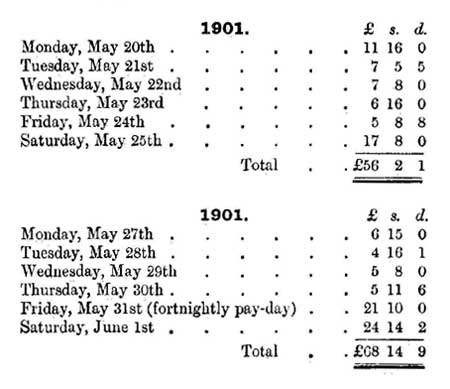
The full effect of pay-day is further shown in the particulars
of another week to which the manager called our attention
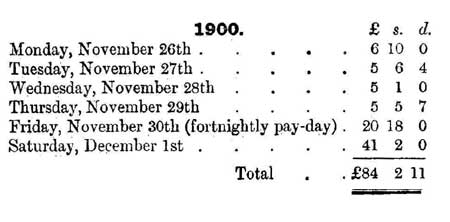
Full particulars of the first year's working results are
given in the following statement, which is copied from the
balance sheet for the year ending December 31st 1900:
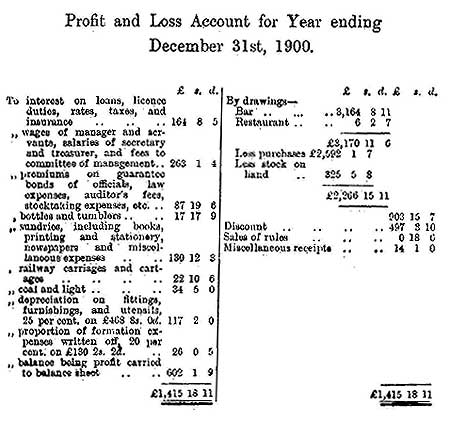
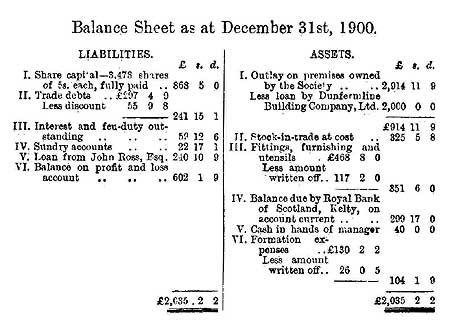
It will be seen that the net profit on the year's trading
was £602.
APPROPRIATION OF PROFITS
Only a portion of the profits has so far been appropriated.
The appropriations already made include a grant of £50
to the local library, and the maintenance of a certificated
district nurse. The district nurse is a great success, and
is very popular in the village. Her maintenance will mean
an expenditure of at least £100 per annum. The general
rule of the Society governing the appropriation of profits
is the same as that adopted by the Hill of Beath Society.
COUNTER-ATTRACTIONS TO THE PUBLIC-HOUSE
As the experiment is only eighteen months old, and has
only completed one financial year, not much has been done
so far in the way of direct counter-attractions to the public-house.
As already explained, out of the last year's profits a grant
of £50 was made to the local library. This institution
is an excellent building, containing a loan library and
reading-room, and a billiard-room with one table, in addition
to accommodation for the caretaker and his family. The members
pay a subscription of 2s. 6d. a year, and the building seems
to be fairly well patronised. Although excellent in its
way, it is quite inadequate to meet the recreative needs
of the village, and especially inadequate as a counter-attraction
to six public-houses and a drink-club. The Public-house
Society, however, proposes shortly to lay down a bowling-green
away from the public-house at a cost of about £500,
and there is also some vague talk of a people's park, but
there is little likelihood that the latter will be established
just yet. It should be mentioned in this connection that
some at least of the other public-houses in Kelty provide
games for their customers.
GENERAL RESULTS
In estimating the general results of the experiment in
Kelty it is but just to make full acknowledgment of what
the present writers believe to be the absolute sincerity
and disinterestedness of aim which led to the establishment
of the scheme. Mr. John Ross, the actual promoter of the
Society, is a well-known and influential citizen, whose
devotion to the cause of education and other public questions
in Fifeshire has won him widespread respect; and it is unquestionable
that in promoting the Fifeshire public-house societies he
has been actuated by a sincere desire to make a practical
contribution to the solution of a difficult and dangerous
problem. He himself regards the local public-house societies
as little more than experiments. " They are,"
he says, " picking their way," and he urges that
they have been in existence for too short a time to show
decisive results.
On the other hand, it is clear that in Kelty local feeling
is strongly oppo'sed to the experiment, and many complaints
are made of increased drunkenness, and of persons who did
not formerly frequent the public-houses of the village,
but who now are said to visit the " Gothenburg "
house owing to its supposed greater respectability. It is
not clear that there is much in this last charge, although
one or two instances were given, nor do we think that it
is quite fair to charge the alleged increase of drunkenness
in Kelty against the new public-house. The fact seems to
be accepted that an increase of drunkenness has taken place
during the last year or so, but this would appear to be
due to (1) the very prosperous times which the miners have
been having; (2) the growth of the population ; and (3)
the establishment of a club which is really no more than
a drinking-saloon without the restrictions of an ordinary
public-house. The chief officer of the local police was
especially emphatic in his condemnation of this club, to
which he evidently attributes the increase of drunkenness.
He went so far as to say that the Sunday closing of the
public-houses in Kelty is being rapidly undone by the heavy
sales in the club on Sunday, and he gave illustrations of
what he had himself seen in support of this. The club was
opened about a year ago, and its establishment seems to
have been the familiar case of a man thwarting the licensing
justices who had refused a licence. In any case, its evil
influence must be kept very prominently in view when considering
the alleged increase of drunkenness in Kelty. The police
officer, in speaking of the " Gothenburg " public-house,
stated that in his experience it was well conducted, and
lie had no complaints to make against it. He seemed to think
(in common with many others) that its chief virtue was that
it diverted the profits of some part at least of the local
liquor traffic to public purposes. On the whole, his testimony
was favourable to, rather than against, the " Gothenburg
" house.
Mr. Terris, J.P., chairman of the Kelty School Board, who
has always been a supporter of the experiment, evinced no
great enthusiasm for it in discussing the matter with one
of the present writers. His great point was that in a choice
between an ordinary public-house and a Company house it
was better to have the Company house. He practically admitted
that the chief value of the experiment was that the profits
were diverted to useful ends.
The opponents of the scheme (some of whom are very hostile)
chiefly take the ground that the way the profits (which
were £602 for the first year) are likely to be appropriated
may injure the cause of temperance by giving the people
a direct monetary interest in the continuance of the traffic.
Some of them also feel that the establishment of the house
has increased drinking and drunkenness; but the chief objection
is clearly the apprehension of an appeal to the cupidity
of the village. In some respects the most weighty opinion
was given by a resident doctor—a comparatively young
man and a regular Church worker. He was, on the whole, distinctly
opposed to the experiment, and especially felt the difficulty
likely to arise out of the villagers' pecuniary interest
in the scheme. It was, however, generally acknowledged that
if a scheme of local option could be devised whereby the
whole of the public-house traffic in Kelty could be brought
undei effective and stringent public management, and arrangements
made under which the locality would derive no profit from
the traffic save and except a fixed grant for direct and
efficient counter-attractions to the public-houses, the
objections now felt would largely disappear.
The present writers are of opinion that it is practically
impossible to decide whether the house has or has not increased
drinking in Kelty. Upon the whole they would be inclined
to suggest that its effect has not been great either way.
That it has not diminished drinking and drunkenness may
be accepted as certain. It could not well be expected to
do this, in view of the fact tbs-t it has increased the
facilities for obtaining drink ; and it is further possible
that to some slight extent it has increased drinking among
those to whom its respectability is said to appeal. (That
this is not the result of the Gothenburg system, rightly
applied, is strikingly shown by the declaration of Mr. Lars
O. Jensan, Right Worthy Grand Templar of Norway, at the
International Alcoholic Congress at The Hague, in 1893.
Mr, Jensen said: " When the Gothenburg system was introduced,
it was feared that this system would throw an air of respectability
about the drinkiug-customs. This has not been so. On the
contrary, it is regarded as a far greater shame to enter
a ftamlag shop than to enter an ordinary drink-shop or restaurant."
).
It is clear, however, that with the competition which the
house encounters it is hopeless to look for very satisfactory
results. In addition to the " Gothenburg" house
there are five other public-houses in Kelty (one of them
immediately opposite), as well as two grocers' licences
and a drink-club. The manager himself is fully alive to
the injurious effect of this competition upon his own efforts.
" My principal bother here," as he recently informed
the special commissioner of the Alliance News, (Alliance
News, June 13th, 1901.)" is drunken people coming
from other places. This place is doing no good. One of its
kind in a place is no use. If we had all the houses in the
place under our management we could do some good; but what
would be the use of us closing earlier, or anything like
that, when our customers would just go across the way to
the public-house opposite ?" In conversation with the
present writers he was equally emphatic.
Summed up briefly, the defects of the Kelty experiment
do not indicate any inherent defect in the principle of
public management, rightly applied and directed, but rather
the urgent necessity of legislation which shall allow localities
to acquire a complete monopoly of the local traffic under
conditions that will give free play both to restrictive
and constructive agencies, and prevent the traffic being
conducted for local pecuniary gain. At present there is
a distinct danger that localities may drift into experiments
before the necessary safeguards are properly understood.
THE COWDENBEATH AND DUNFERMLINE PUBLIC-HOUSE
SOCIETIES, LIMITED
Similar societies to those at Hill of Beath and Kelty have
recently been formed at Cowdenbeath and Dunferm-line. In
neither case, however, has an additional licence been applied
for. At Cowdenbeath an existing public-house was purchased
for £7,000 (£4,000 of which was said to represent
the value of the licence alone); while at Dunfermline a
smaller house was provisionally acquired for £3,000.
In the latter case the sale was conditional upon a transfer
of the licence being obtained. The transfer was, however,
subsequently refused by a majority of the licensing justices,
with the result that the proposed sale was not completed.
At Cowdenbeath the Society has already begun operations,
but the experiment has been working for too short a time
to justify comment here.
|





